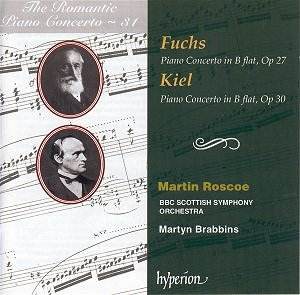This is the thirty-first volume in Hyperion's Romantic
Piano Concerto series. Two three movement concertos are offered.
The Fuchs work was written when he was 33. One
does not need Hartmut Wecker's notes to detect that Fuchs was a fervent
Brahms disciple. Both the grand mien of the Brahms Second Piano Concerto
and the craggy virtuosity and striking gestures of the First Concerto
are to be heard. Parry's firebrand of a First Symphony also suggests
itself. Fuchs has already caught the attention with a Thorofon CD of
his violin sonatas (more to come) and the same label has buried in their
back catalogue two more CDs including Fuchs' symphonies - works that
look to be particularly rewarding.
If Fuchs drank deep at the Brahmsian wellspring Friedrich
Kiel's single piano concerto echoes and re-echoes with the orchestral
voice of Robert Schumann. The music blends the surreptitiously poetic
with extrovert brilliance. Beethovenian pathos also makes an appearance
especially in the adagio.
To some extent these two composers live on only because
of their famous pupils. For Fuchs it was a roll-call that included Wolf,
Schreker, Zemlinsky, Korngold and Sibelius. Kiel numbered amongst his
pupils Stanford, Somervell, Bennett, Cowen, Richard Nordraak and Emil
Sjögren. Less famous names in the Kiel honour roll include Victor
von Herzfeld, Siegfried Ochs, Arnold Mendelssohn, Max Gulbins, Waldemar
von Bausznern and Bernard Stavenhagen.
As Hartmut Wecker points out in his splendidly discursive
notes, Kiel was killed in a traffic accident at the height of his fame.
Fuchs however long outlived his master who had died in 1897. Fuchs’
Brahmsian brotherhood were left high and dry by the new wave represented
by Mahler. When Fuchs died in 1927 just short of eighty he had long
sunk into obscurity.
What we have here are two ripe and lively German romantic
piano concertos despatched in true style by Roscoe and the BBC Scottish.
I have visions that this whole series will one day be issued in a special
package. By that time perhaps a new carrier will accommodate much of
the series in a quarter of the shelf space. On reflection I would rather
that the series continued indefinitely. Perhaps having reached the fiftieth
volume it will continue as a series 2 for another 50 and feature concertos
by Bortkiewicz (2 and 3), the second and third by Scharwenka, Gaze Cooper
(determinedly old-fashioned and not a million miles away from Kiel and
Fuchs), Roger Sacheverell Coke, the luxuriant Sorabji concertos as well
as those by Stavenhagen, Dzerzhinsky (Russian populist romantic) and
so many others.
A delight for romantic piano concerto fanciers.
Rob Barnett

